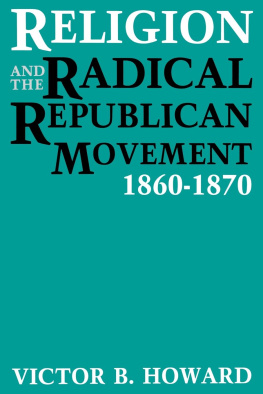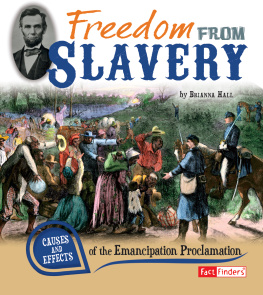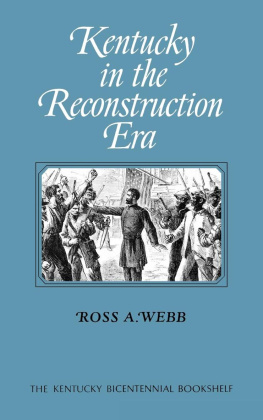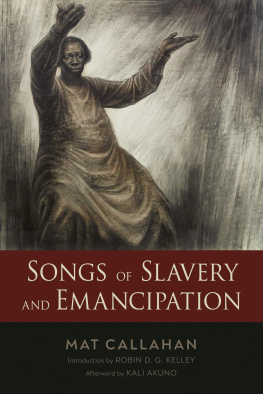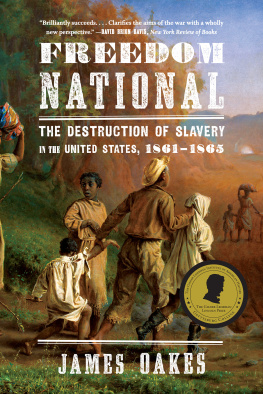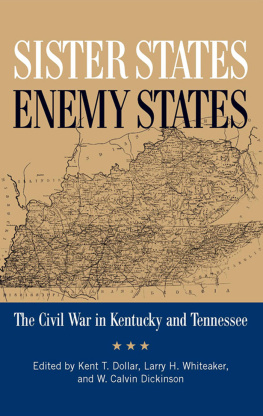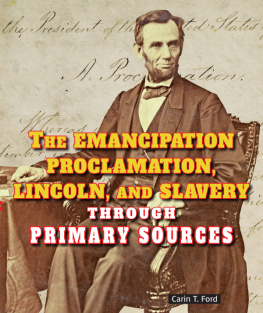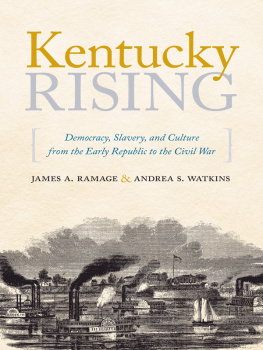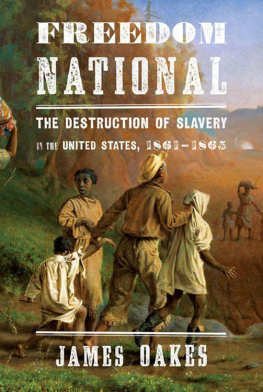Copyright 1990 by The University Press of Kentucky
Scholarly publisher for the Commonwealth, serving Bellarmine College, Berea College, Centre College of Kentucky, Eastern Kentucky University, The Filson Club, Georgetown College, Kentucky Historical Society, Kentucky State University, Morehead State University, Murray State University, Northern Kentucky University, Transylvania University, University of Kentucky, University of Louisville, and Western Kentucky University.
Editorial and Sales Offices: Lexington, Kentucky 40506-0336
Library of Congress Cataloging-in-Publication Data
Howard, Victor B.
Religion and the radical Republican movement, 1860-1870 / Victor B. Howard.
p. cm.
Includes bibliographical references.
ISBN 978-0-8131-5615-6
1. United StatesPolitics and governmentCivil War, 1861-1865. 2. United StatesHistoryCivil War, 1861-1865Religious aspects. 3. Reconstruction. 4. United StatesPolitics and government1865-1877. 5. Slavery and the churchUnited States. 6. SlaveryUnited StatesEmancipation. 7. Church and stateUnited StatesHistory19th century. I. Title.
This book is printed on acid-free paper meeting the requirements of the American National Standard for Permanence of Paper for Printed Library Materials.

Preface
This book is a study of the interplay of religion and politics during the Civil War era. More specifically it examines the extent to which religion set the moral tone of the North during the period 1860-1870. The study focuses on the growing influence of the evangelical and liberal churches during the period. This influence was largely exerted through the agency of the radical Republicans, a faction that took an extreme position on war measures and on reconstruction after the war. I have examined the degree to which radicalism was inspired by moral motivation and the action that followed the moral commitment.
The quest for source material to undertake this task took me to many religious as well as political depositories. This work would have been impossible without the cooperation of the staff of the Camden-Carroll Library, Morehead State University, particularly of the inter-library loan librarians, Betty Lane, and Carol Nutter. I wish to express my gratitude to the Manuscript Division and the Interlibrary Loan Division of the Library of Congress. I owe a debt of gratitude to the libraries of the following institutions: the American Antiquarian Society, the Amistad Research Center, Berea College, Boston Public Library, Calasis Free Public Library, Chicago Historical Society, Indiana Historical Society, Cincinnati Historical Society, Columbia University, Connecticut Historical Society, Cornell University, DePauw University, Drew University, Emory University, Essex Institute, Pennsylvania Historical Society, Knox College, Massachusetts Historical Society, Minnesota Historical Society, New York Historical Society, Oberlin College, Radcliffe College, Syracuse University, University of Kentucky, Earlham College, University of Michigan, University of Rochester, University of Tennessee, University of West Virginia, Yale University, Western Reserve Historical Society, and Worcester Historical Society. Special thanks are due to the Connecticut State Library, Detroit Public Library, Houghton Library of Harvard University, Huntington Library, Illinois State Historical Library, Indiana State Historical Library, Iowa State Historical Library, New York Public Library, New York State Historical Library, Ohio State Historical Library, Rutherford B. Hayes Library, and the Wisconsin State Historical Library.
This volume would not have been possible without the assistance of the libraries and archives of many divinity schools and religious institutions, including: American Baptist Historical Society, United Methodist Archives Center, Wesleyan Methodist Church Archives, Free Methodist Church Archives, Ohio Wesleyan University Library, Presbyterian Historical Society, the Congregational Library of the American Congregational Association, Asbury Theological Seminary, Lutheran Theological Seminary, Harvard Divinity School, Yale University Divinity School, Southern Baptist Theological Seminary, Historical Commission of the Southern Baptist Sunday School Board, Chicago Theological Seminary, Friends Historical Library of Swarthmore, McCormick Theological Seminary, Union Theological Seminary, General Theological Seminary, and Garrett-Evangelical-Seabury-Western Theological Seminaries United Library.
I am indebted to more than a hundred county historical societies and county libraries that furnished me with xeroxed records of county histories, obituaries and local church records that helped me to identify the religious affiliations of individuals who registered their convictions on the moral questions that were debated during the Civil War era.
I wish to express my thanks to Allan Bogue, who graciously shared his material on the religious affiliations of the United States senators during the Civil War era. I am indebted to the American Philosophical Society for granting me the Penrose Award for research in the early stages of this project. The Morehead State University Faculty Research Committee made generous research grants to help finance the travel necessary for my research and financed the typing of the monograph. I am indebted to Carolyn H. Hamilton who typed the manuscript with accuracy and patience. Wilma B. Howard read all that was written, offered frank and critical suggestions on revision, and proofread all drafts of the manuscript.
Introduction
This book seeks to examine the influence of the churches in shaping the course of the Civil War and the extent to which the religious community conditioned the character and course of Reconstruction. The clergy and the Protestant churches played a significant role in molding and supporting Radical Reconstruction. The Northern Protestant church was the conscience of the Republican party and was recognized as the mainstay of the radical program. Henry Wilson, a Congregational layman, declared, during the war, that the Republican party contained more... moral... worth than was ever embodied in any political organization in any land... , created by no man... , brought into being by Almighty God himself. Kenneth Stampp called attention to the fact that churches furnished the chief institutional vicinage in which the antislavery impulse throve during the Civil War and Reconstruction.
In the antebellum era, secessions from the evangelical religious denominations created three radical antislavery churchesthe Wesleyan Methodist Connection, the Free Methodist Church, and the Free Presbyterian Church. Sectional schisms separated several of the evangelical churches as a result of the slavery controversy. The Old and New School Presbyterians divided because of doctrinal differences and the slavery question in 1837. The Methodist Episcopal Church, South, separated from the Methodist Episcopal Church in 1844, and the Southern Baptists separated from the Northern church and established the Southern Baptist Convention in 1845. In 1857 the Southern synods of the New School Presbyterian Church withdrew from the General Assembly because of the slavery controversy in the General Assembly. In 1861 the Southern synods left the Old School Presbyterian General Assembly when the majority passed a loyalty resolution.

